Charles E W Bean, Diaries, AWM38 3DRL 606/243A/1 - 1916 - 1934 - Part 22
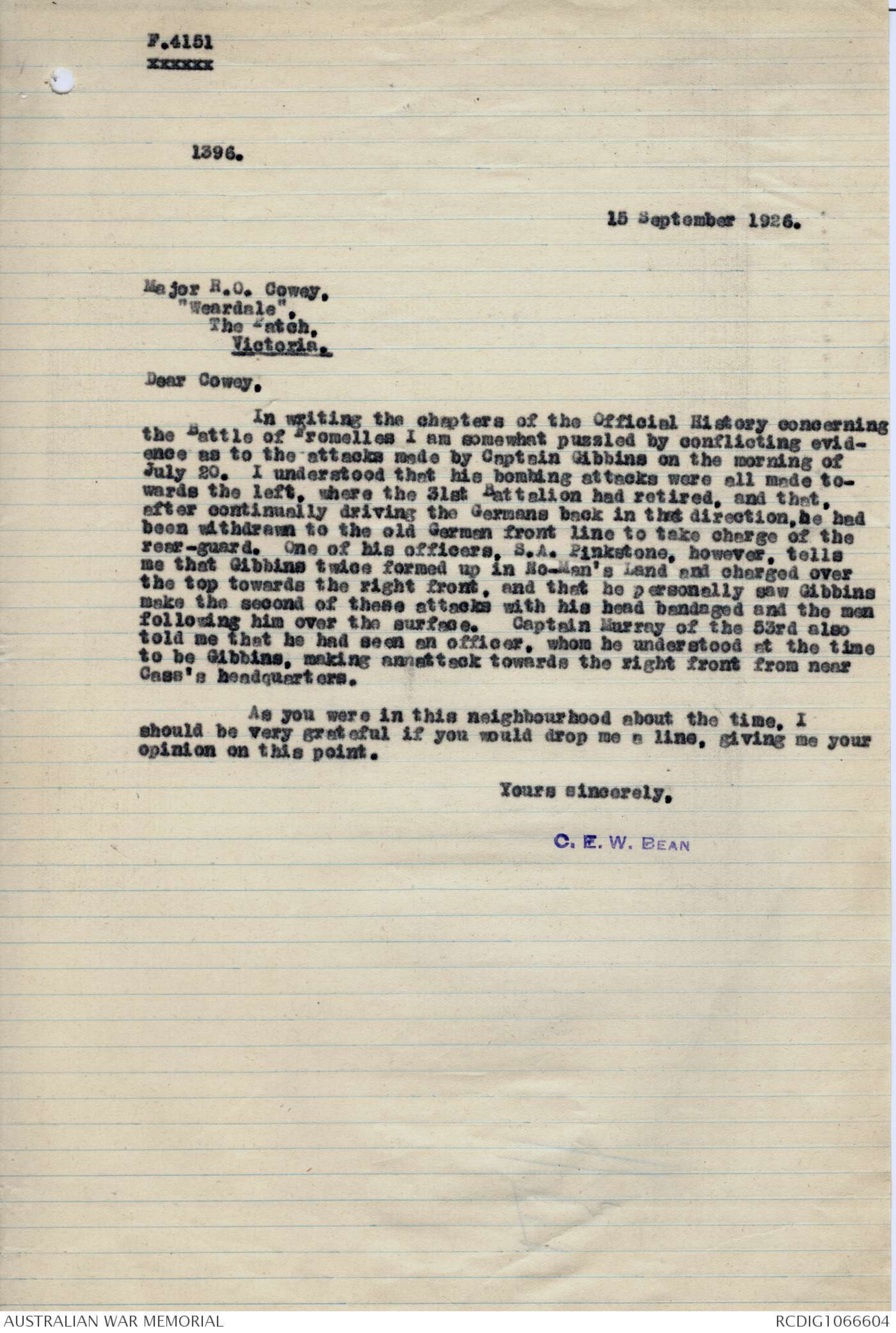
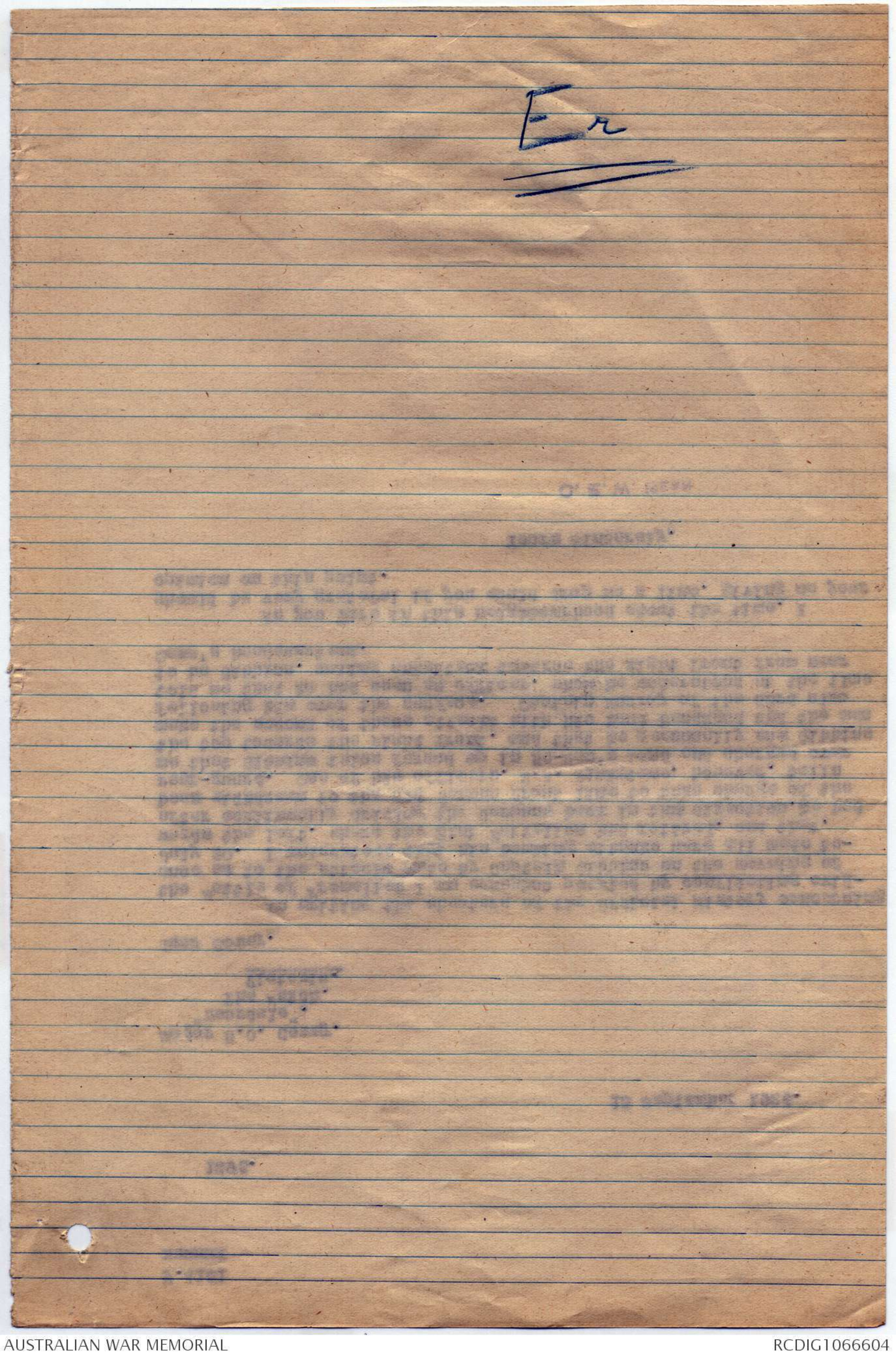
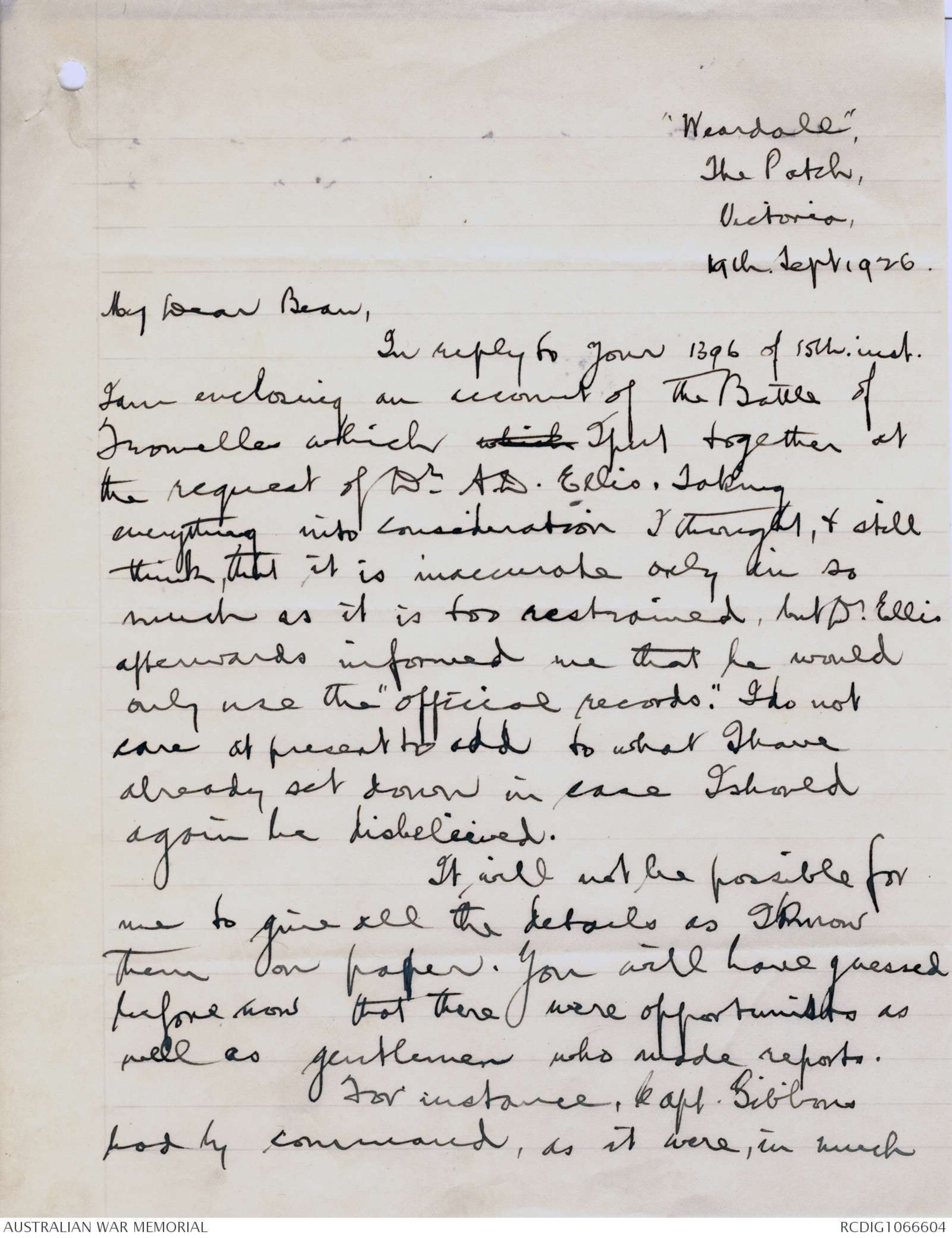
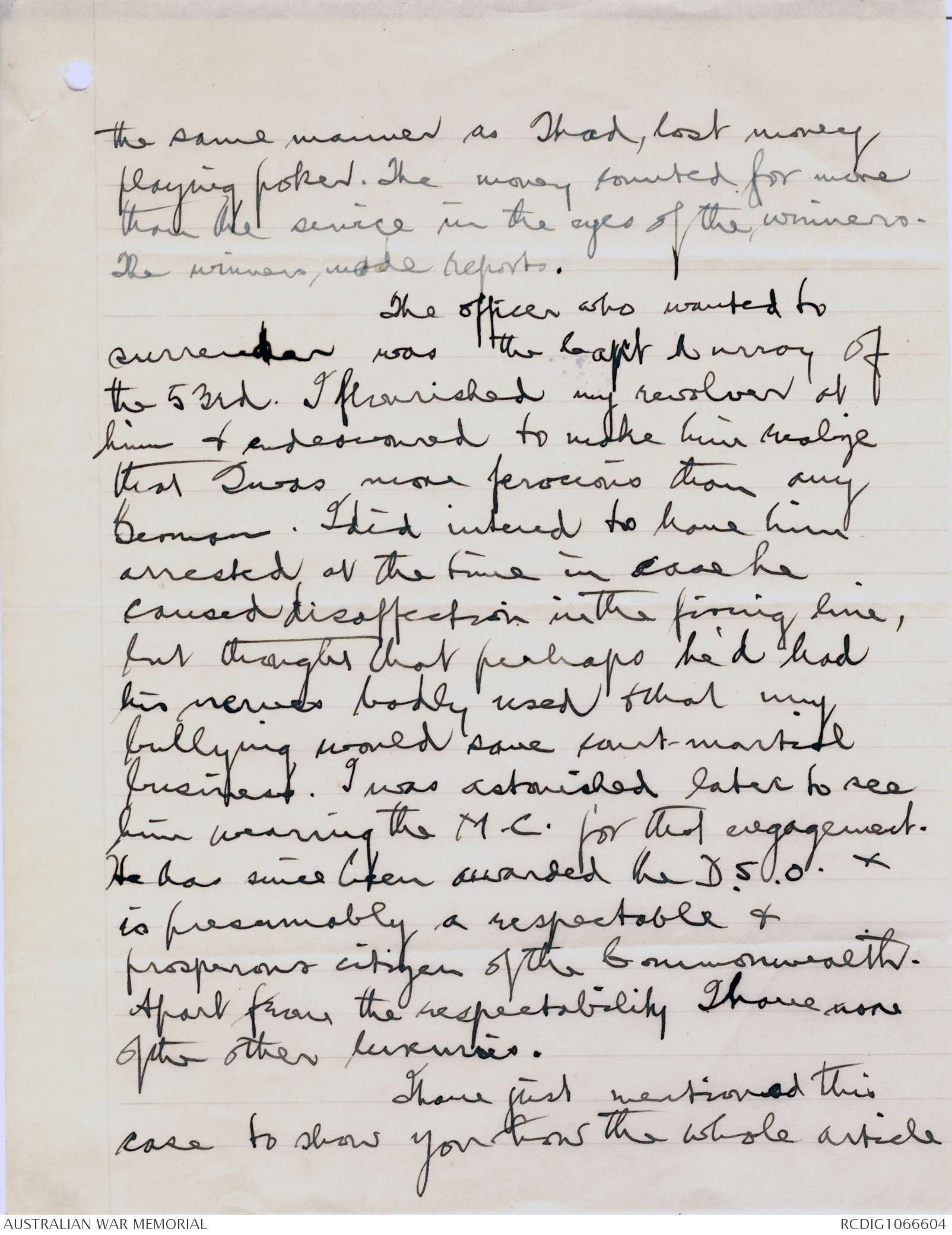
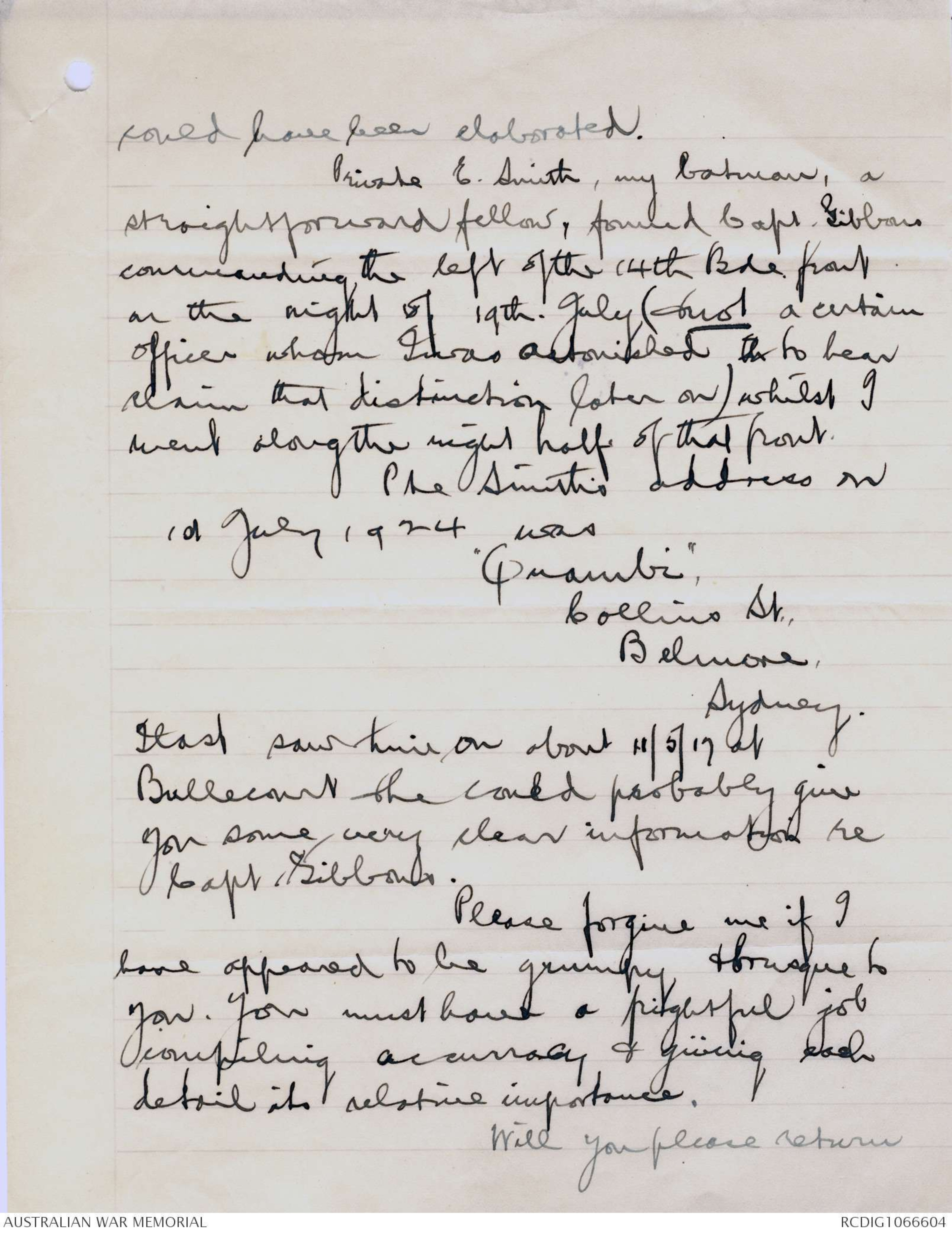
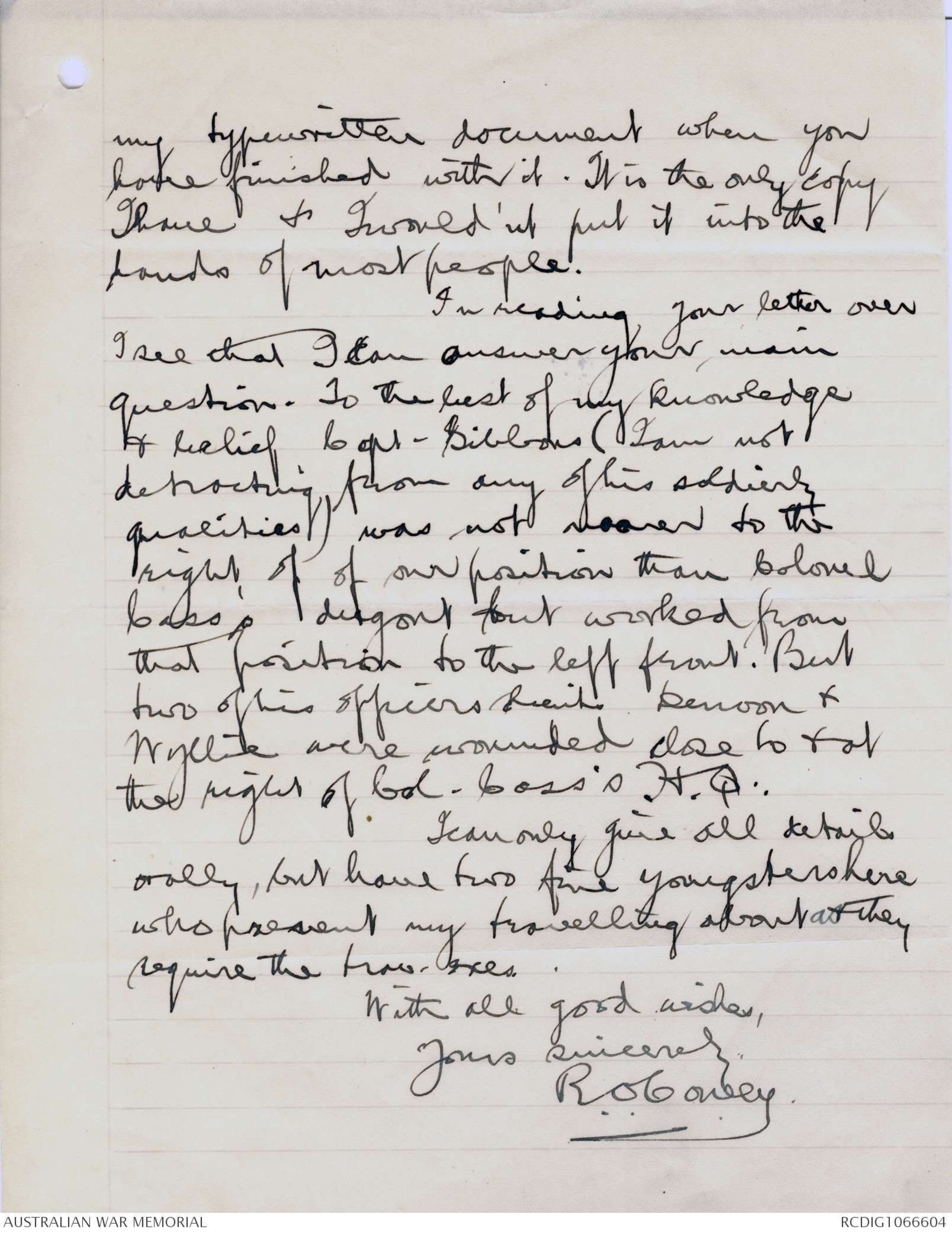
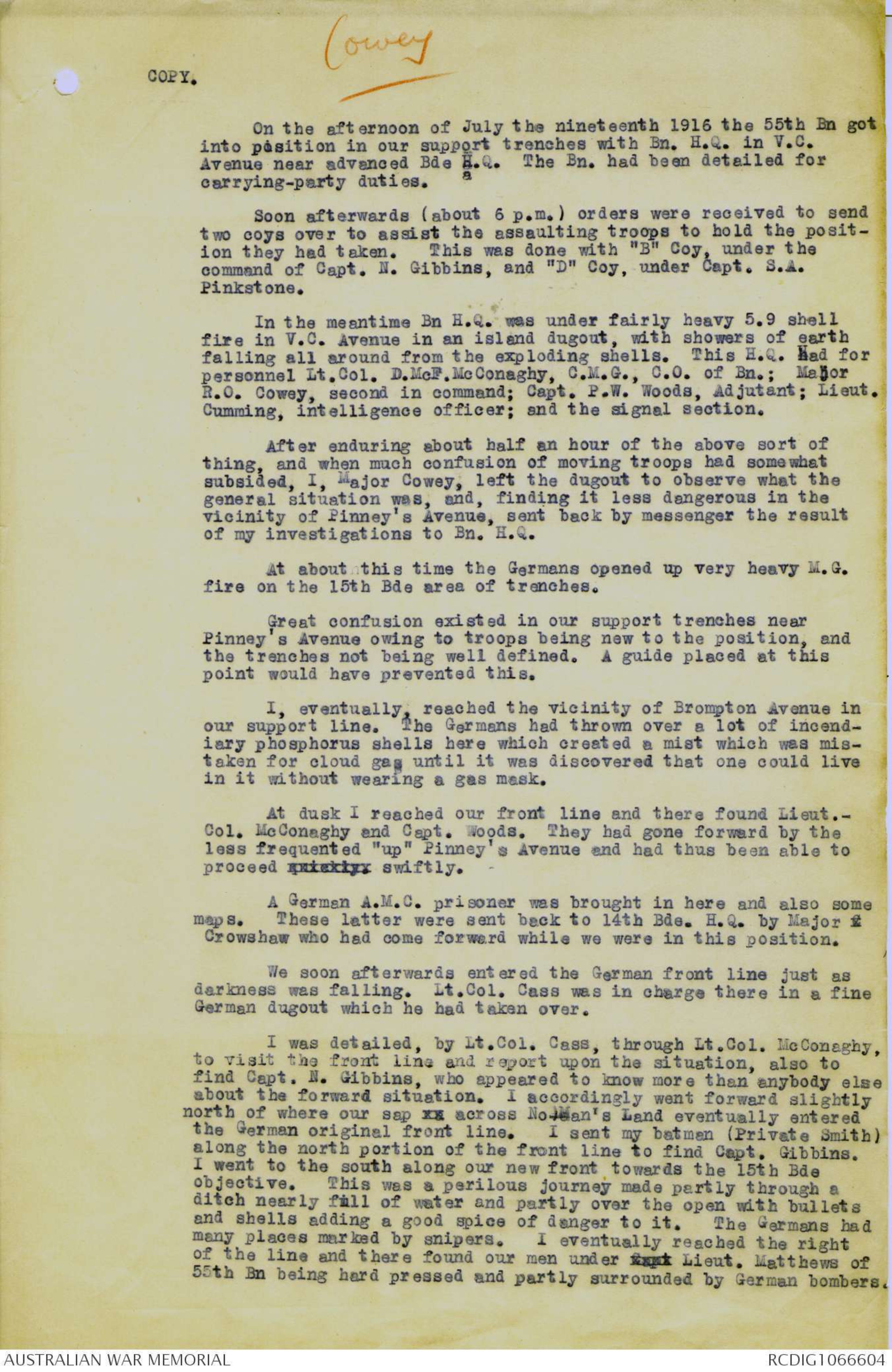
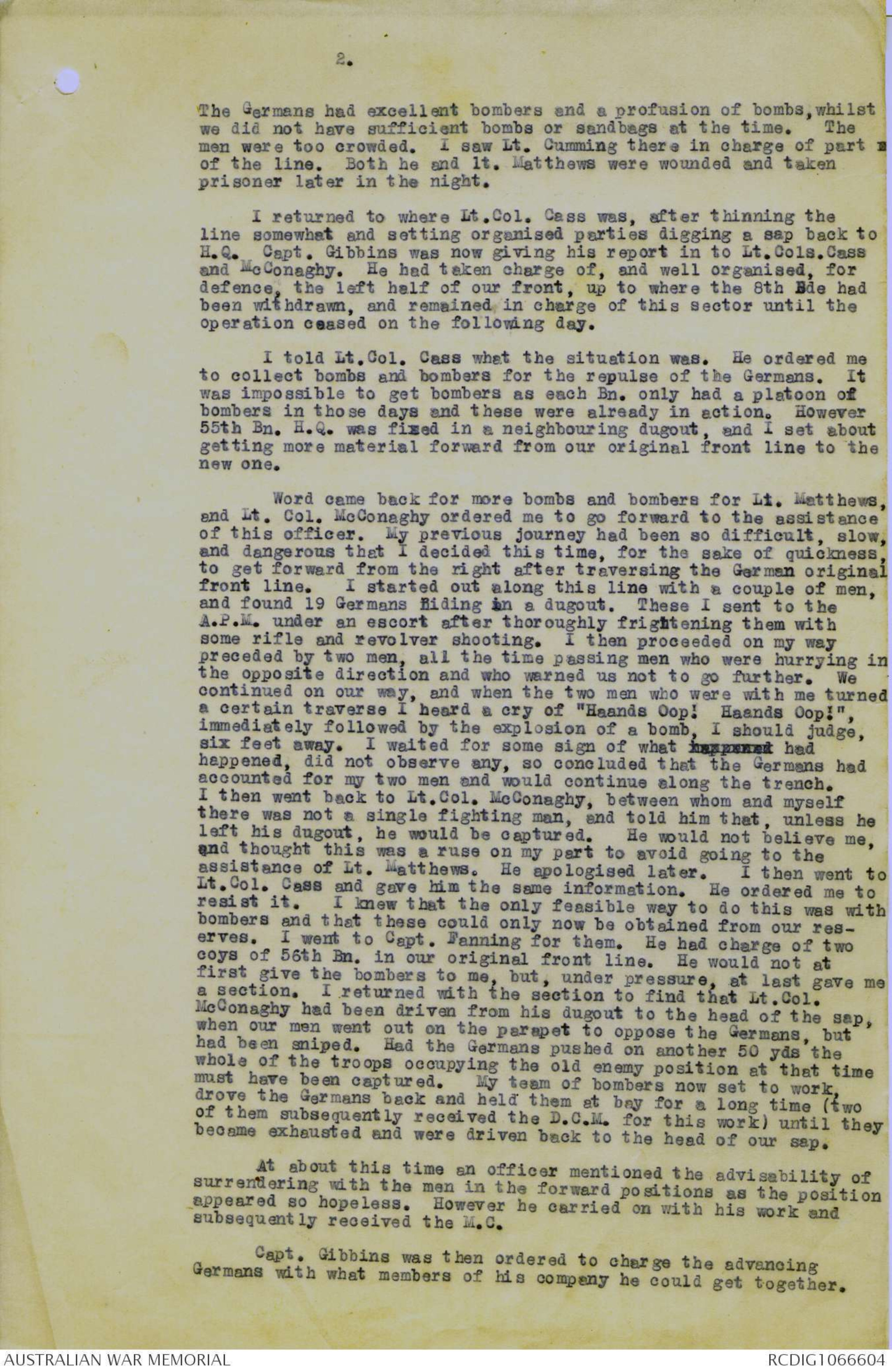
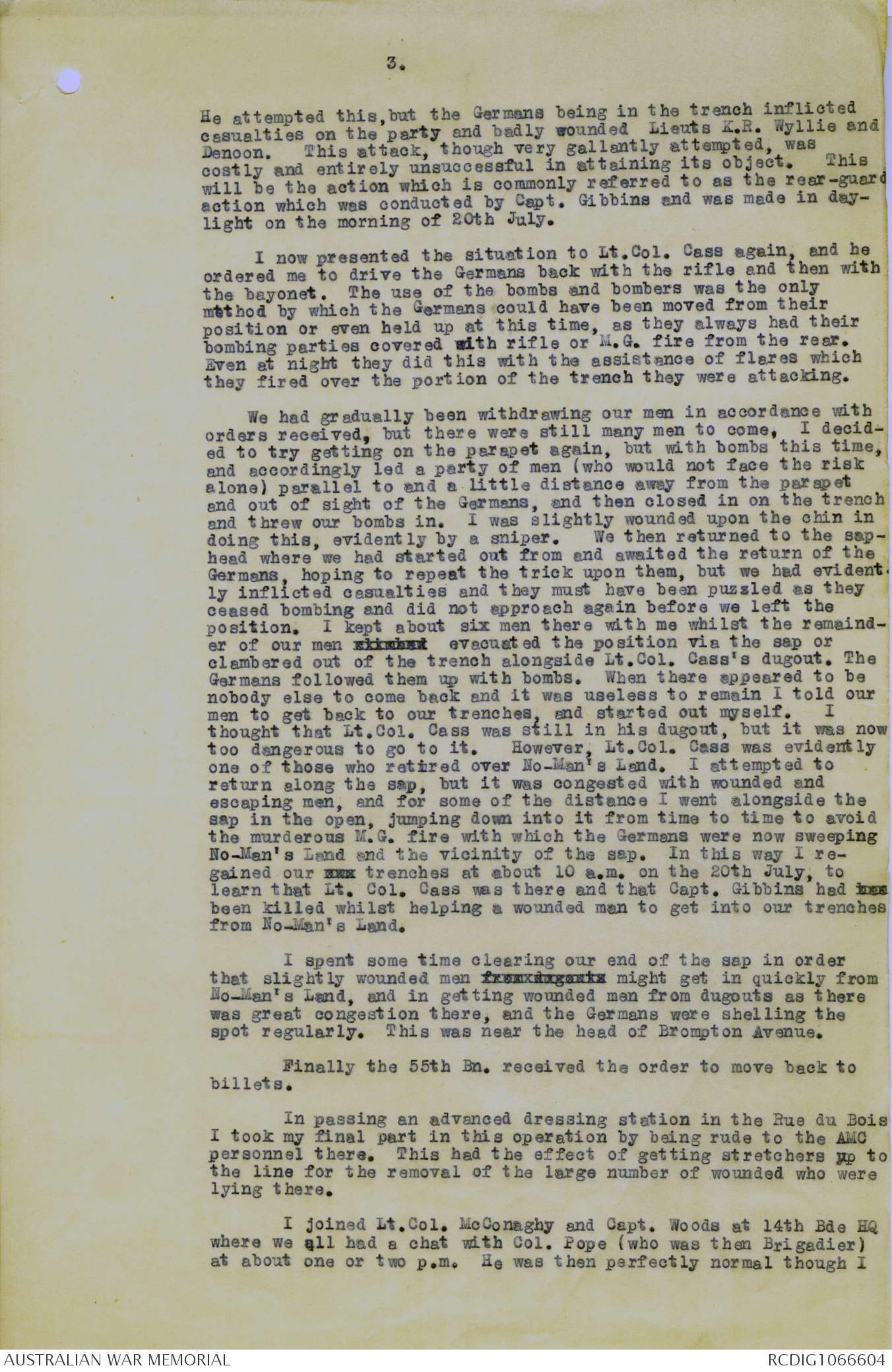
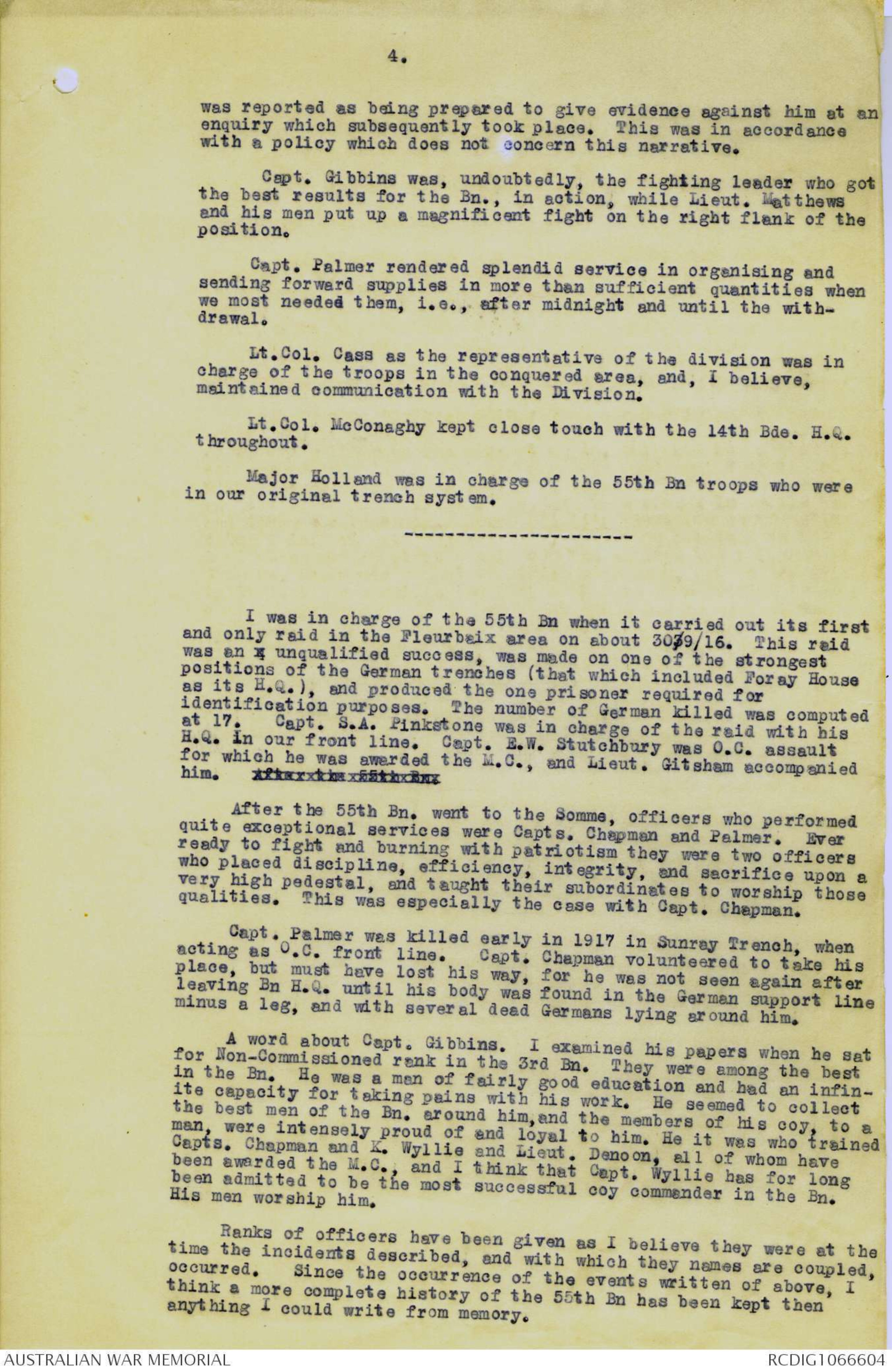
F.4151
xxxxxx
1396.
15 September 1926.
Major H.O. Cowey,
"Weardale",
The Patch,
Victoria.
Dear Cowey,
in writing the chapters of the Official History concerning
the Battle of Fromelles I am somewhat puzzled by conflicting evidence
as to the attacks made by Captain Gibbins on the morning of
July 20. I understood that his bombing attacks were all made towards
the left, where the 31st Battalion had retired, and that,
after continually driving the Germans back in that direction, he had
been withdraw to the old German front line to take charge of the
rear-guard. One of his officers, S.A. Pinkstone, however, tells
me that Gibbins twice formed up in No-Man's Land and charged over
the top towards the right front, and that he personally saw Gibbins
make the second of these attacks with his head bandaged and the men
following him over the surface. Captain Murray of the 53rd also
told me that he had seen an officer, whom he understood at the time
to be Gibbins, making annattack towards the right front from near
Cass's headquarters.
As you were in this neighbourhood about the time, I
should be very grateful if you would drop me a line, giving me your
opinion on this point.
Yours sincerely,
C. E. W. BEAN
Er
"Weardale",
The Patch,
Victoria,
19th Sept 1926.
My Dear Bean,
In reply to your 1396 of 15th inst.
I am enclosing an account of the Battle of
Fromelles which which I put together at
the request of Dr A.D. Ellis. Taking
everything into consideration I thought, & still
think, that it is inaccurate only in so
much as it is too restrained, but Dr Ellis
afterwards informed me that he would
only use the "official records". I do not
care at present to add to what I have
already set down in case I should
again be disbelieved.
It will not be possible for
me to give all the details as I know
them on paper. You will have guessed
before now that there were opportunists as
well as gentlemen who made reports.
For instance, Capt. Gibbons
had by command, as it were, in much
the same manner as I had, lost money
playing poker. The money counted for more
than the service in the eyes of the winners -
The winners made reports.
The officer who wanted to
surrender was the Capt Murray of
the 53rd. I flourished my revolver at
him & endeavoured to make him realize
that I was more ferocious than any
German. I did intend to have him
arrested at the time in case he
caused disaffection in the firing line,
but thought that perhaps he'd had
his nerves badly used & that my
bullying would save court-martial
business. I was astonished later to see
him wearing the M.C. for that engagement.
He has since been awarded the D.SO. &
is presumably a respectable &
prosperous citizen of the Commonwealth.
Apart from the respectability I have none
of the other luxuries.
I have just mentioned this
case to show you how the whole article
could have been elaborated.
Private E. Smith, my batman, a
straight forward fellow, found Capt. Gibbons
commanding the left of the 14th Bde. front
on the night of 19th. July (& not a certain
officer whom I was astonished th to hear
claim that distinction later on) whilst I
went along the right half of that front.
Pte Smith's address on
10 July 1924 was
"Quambi",
Collins St.,
Belmore,
Sydney.
I last saw him on about 11/5/17 at
Bullecourt & he could probably give
you some very clear information re
Capt. Gibbons.
Please forgive me if I
have appeared to be grumpy & brusque to
you. You must have a frightful job
compiling accuracy & giving each
detail its relative importance.
Will you please return
my typewritten document when you
have finished with it. It is the only copy
I have & I wouldn't put it into the
hands of most people.
In reading your letter over
I see that I can answer your main
question. To the best of my knowledge
& belief Capt - Gibbons (I am not
detracting from any of his soldierly
qualities) was not nearer to the
right of our position than Colonel
Cass's dugout but worked from
that position to the left front. But
two of his officers Lieuts Denoon &
Wyllie were wounded close to & at
the right of Col. Cass's s H.Q..
I can only give all details
orally, but have two fine youngsters here
who prevent my travelling about as they
require the [[horses?]]
With all good wishes,
Yours sincerely
R. O. Cowey.
Cowey
COPY.
On the afternoon of July the nineteenth 1916 the 55th Bn got
into position in our support trenches with Bn. H.Q. in V.C.
Avenue near advanced Bde H.Q. The Bn. had been detailed for
carrying-party duties.
Soon afterwards (about 6 p.m.) orders were received to send
two coys over to assist the assaulting troops to hold the position
they had taken. This was done with "B" Coy, under the
command of Capt. N. Gibbins, and "D" Coy, under Capt. S.A.
Pinkstone.
In the meantime Bn H.Q. was under fairly heavy 5.9 shell
fire in V.C. Avenue in an island dugout, with showers of earth
falling all around from the exploding shells. This H.Q. had for
personnel Lt. Col. D.McF. McConaghy, C.M.G., C.O. of Bn.; Major
R.O. Cowey, second in command; Capt. P.W. Woods, Adjutant; Lieut.
Cumming, intelligence officer; and the signal section.
After enduring about half an hour of the above sort of
thing, and when much confusion of moving troops had somewhat
subsided, I, Major Cowey, left the dugout to observe what the
general situation was, and, finding it less dangerous in the
vicinity of Pinneys Avenue, sent back by messenger the result
of my investigations to Bn. H.Q.
At about this time the Germans opened up very heavy M.G.
fire on the 15th Bde area of trenches.
Great confusion existed in our support trenches near
Pinney's Avenue owing to troops being new to the position, and
the trenches not being well defined. A guide placed at this
point would have prevented this.
I, eventually, reached the vicinity of Brompton Avenue in
our support line. The Germans had thrown over a lot of incendiary
phosphorus shells here which created a mist which was mistaken
for cloud gas until it was discovered that one could live
in it without wearing a gas mask.
At dusk I reached our front line and there found Lieut. -
Col. McConaghy and Capt. Woods. They had gone forward by the
less frequented "up" Pinney's Avenue and had thus been able to
proceed xxxxxxx swiftly.
A German A.M.C. prisoner was brought in here and also some
maps. These latter were sent back to 14th Bde. H.Q. by Major x
Crowshaw who had come forward while we were in this position.
We soon afterwards entered the German front line just as
darkness was falling. Lt.Col. Cass was in charge there in a fine
German dugout which he had taken over.
I was detailed, by Lt. Col. Cass, through Lt. Col. McConaghy,
to visit the front line and report upon the situation, also to
find Capt. N. Gibbins, who appeared to know more than anybody else
about the forward situation. I accordingly went forward slightly
north of where our sap xx across No-Man’s Land eventually entered
the German original front line. I sent my batmen (Private Smith)
along the north portion of the front line to find Capt. Gibbins.
I went to the south along our new front towards the 15th Bde
objective. This was a perilous journey made partly through a
ditch nearly full of water and partly over the open with bullets
and shells adding a good spice of danger to it. The Germans had
many places marked by snipers. I eventually reached the right
of the line and there found our men under xxxx Lieut. Matthews of
55th Bn being hard pressed and partly surrounded by German bombers.
2.
The Germans had excellent bombers and a profusion of bombs, whilst
we did not have sufficient bombs or sandbags at the time. The
men were too crowded. I saw Lt. Cumming there in charge of part x
of the line. Both he and lt. Matthews were wounded and taken
prisoner later in the night.
I returned to where Lt. Col. Cass was, after thinning the
line somewhat and setting organised parties digging a sap back to
H.Q. Capt. Gibbins was now giving his report in to Lt. Cols. Cass
and McConaghy. He had taken charge of, and well organised, for
defence, the left half of our front, up to where the 8th Bde had
been withdrawn, and remained in charge of this sector until the
operation ceased on the following day.
I told Lt. Col. Cass what the situation was. He ordered me
to collect bombs and bombers for the repulse of the Germans. It
was impossible to get bombers as each Bn. only had a platoon of
bombers in those days and these were already in action. However
55th Bn. H.Q. was fixed in a neighbouring dugout, and I set about
getting more material forward from our original front line to the
new one.
Word came back for more bombs and bombers for Lt. Matthews,
and Lt. Col. McConaghy ordered me to go forward to the assistance
of this officer. My previous journey had been so difficult, slow,
and dangerous that I decided this time, for the sake of quickness,
to get forward from the right after traversing the German original
front line. I started out along this line with a couple of men,
and found 19 Germans hiding in a dugout. These I sent to the
A.P.M. under an escort after thoroughly frightening them with
some rifle and revolver shooting. I then proceeded on my way
preceded by two men, all the time passing men who were hurrying in
the opposite direction and who warned us not to go further. We
continued on our way, and when the two men who were with me turned
a certain traverse I heard a cry of "Haands Oop! Haands Oop!",
immediately followed by the explosion of a bomb, I should judge,
six feet away. I waited for some sign of what happened had
happened, did not observe any, so concluded that the Germans had
accounted for my two men and would continue along the trench.
I then went back to Lt. Col. McConaghy, between whom and myself
there was not a single fighting man, and told him that, unless he
left his dugout, he would be captured. He would not believe me,
and thought this was a ruse on my part to avoid going to the
assistance of Lt. Matthews. He apologised later. I then went to
Lt. Col. Cass and gave him the same information. He ordered me to
resist it. I knew that the only feasible way to do this was with
bombers and that these could only now be obtained from our reserves.
I went to Capt. Fanning for them. He had charge of two
coys of 56th Bn. in our original front line. He would not at
first give the bombers to me, but, under pressure, at last gave me
a section. I returned with the section to find that Lt. Col.
McConaghy had been driven from his dugout to the head of the sap,
when our men went out on the parapet to oppose the Germans, but
had been sniped. Had the Germans pushed on another 50 yds the
whole of the troops occupying the old enemy position at that time
must have been captured. My team of bombers now set to work,
drove the Germans back and held them at bay for a long time (two
of them subsequently received the D.C.M. for this work) until they
became exhausted and were driven back to the head of our sap.
At about this time an officer mentioned the advisability of
surrendering with the men in the forward positions as the position
appeared so hopeless. However he carried on with his work and
subsequently received the M.C.
Capt. Gibbins was then ordered to charge the advancing
Germans with what members of his company he could get together.
3.
He attempted this, but the Germans being in the trench inflicted
casualties on the party and badly wounded Lieuts K.R. Wyllie and
Denoon. This attack, though very gallantly attempted, was
costly and entirely unsuccessful in attaining its object. This
will be the action which is commonly referred to as the rear-guard
action which was conducted by Capt. Gibbins and was made in daylight
on the morning of 20th July.
I now presented the situation to Lt. Col. Cass again, and he
ordered me to drive the Germans back with the rifle and then with
the bayonet. The use of the bombs and bombers was the only
method by which the Germans could have been moved from their
position or even held up at this time, as they always had their
bombing parties covered with rifle or M.G. fire from the rear.
Even at night they did this with the assistance of flares which
they fired over the portion of the trench they were attacking.
We had gradually been withdrawing our men in accordance with
orders received, but there were still many men to come, I decided
to try getting on the parapet again, but with bombs this time,
and accordingly led a party of men (who would not face the risk
alone) parallel to and a little distance away from the parapet
and out of sight of the Germans, and then closed in on the trench
and threw our bombs in. I was slightly wounded upon the chin in
doing this, evidently by a sniper. We then returned to the saphead
where we had started out from and awaited the return of the
Germans, hoping to repeat the trick upon them, but we had evidently
inflicted casualties and they must have been puzzled as they
ceased bombing and did not approach again before we left the
position. I kept about six men there with me whilst the remainder
of our men xxxxxxx evacuated the position via the sap or
clambered out of the trench alongside Lt. Col. Cass's dugout. The
Germans followed them up with bombs. When there appeared to be
nobody else to come back and it was useless to remain I told our
men to get back to our trenches, and started out myself. I
thought that Lt. Col. Cass was still in his dugout, but it was now
too dangerous to go to it. However, Lt. Col. Cass was evidently
one of those who retired over No-Man’s Land. I attempted to
return along the sap, but it was congested with wounded and
escaping men, and for some of the distance I went alongside the
sap in the open, jumping down into it from time to time to avoid
the murderous M.G. fire with which the Germans were now sweeping
No-Man’s Land and the vicinity of the sap. In this way I regained
our xxx trenches at about 10 a.m. on the 20th July, to
learn that Lt. Col. Cass was there and that Capt. Gibbins had xxx
been killed whilst helping a wounded man to get into our trenches
from No-Man's Land.
I spent some time clearing our end of the sap in order
that slightly wounded men from dugouts might get in quickly from
No-Man’s Land, and in getting wounded men from dugouts as there
was great congestion there, and the Germans were shelling the
spot regularly. This was near the head of Brompton Avenue.
Finally the 55th Bn. received the order to move back to
billets.
In passing an advanced dressing station in the Rue du Bois
I took my final part in this operation by being rude to the AMC
personnel there. This had the effect of getting stretchers up to
the line for the removal of the large number of wounded who were
lying there.
I Joined Lt. Col. McConaghy and Capt. Woods at 14th Bde HQ
where we all had a chat with Col. Pope (who was then Brigadier)
at about one or two p.m. He was then perfectly normal though I
4.
was reported as being prepared to give evidence against him at an
enquiry which subsequently took place. This was in accordance
with a policy which does not concern this narrative.
Capt. Gibbins was, undoubtedly, the fighting leader who got
the best results for the Bn., in action, while Lieut. Matthews
and his men put up a magnificent fight on the right flank of the
position.
Capt. Palmer rendered splendid service in organising and
sending forward supplies in more than sufficient quantities when
we most needed them, i.e., after midnight and until the withdrawal.
Lt. Col. Cass as the representative of the division was in
charge of the troops in the conquered area, and, I believe,
maintained communication with the Division.
Lt. Col. McConaghy kept close touch with the 14th Bde. H.Q.
throughout.
Major Holland was in charge of the 55th Bn troops who were
in our original trench system.
I was in charge of the 55th Bn when it carried out its first
and only raid in the Fleurbaix area on about 30/9/16. This raid
was an x unqualified success, was made on one of the strongest
positions of the German trenches (that which included Foray House
as its H.Q.), and produced the one prisoner required for
identification purposes. The number of German Killed was computed
at 17. Capt. S.A. Pinkstone was in charge of the raid with his
H.Q. In our front line. Capt. E.W. Stutchbury was O.C. assault
for which he was awarded the M.C., and Lieut. Gitsham accompanied
him. xxxxxxxxxxxxxxxxx
After the 55th Bn. went to the Somme, officers who performed
quite exceptional services were Capts. Chapman and Palmer. Ever
ready to fight and burning with patriotism they were two officers
who placed discipline, efficiency, integrity, and sacrifice upon a
very high pedestal, and taught their subordinates to worship those
qualities. This was especially the case with Capt. Chapman.
Capt. Palmer was killed early in 1917 in Sunray Trench, when
acting as O.C. front line. Capt. Chapman volunteered to take his
place, but must have lost his way, for he was not seen again after
leaving Bn H.Q. until his body was found in the German support line
minus a leg, and with several dead Germans lying around him.
A word about Capt. Gibbins. I examined his papers when he sat
for Non-Commissioned rank in the 3rd Bn. They were among the best
in the Bn. He was a man of fairly good education and had an infinite
capacity for taking pains with his work. He seemed to collect
the best men of the Bn. around him, and the members of his coy, to a
man, were intensely proud of and loyal to him. He it was who trained
Capts. Chapman and K. Wyllie and Lieut. Denoon, all of whom have
been awarded the M.C., and I think that Capt. Wyllie has for long
been admitted to be the most successful coy commander in the Bn.
His men worship him.
Ranks of officers have been given as I believe they were at the
time the incidents described, and with which they names are coupled,
occurred. Since the occurrence of the events written of above, I
think a more complete history of the 55th Bn has been kept then
anything I could write from memory.
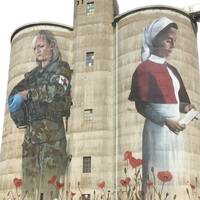 Jenny B
Jenny BThis transcription item is now locked to you for editing. To release the lock either Save your changes or Cancel.
This lock will be automatically released after 60 minutes of inactivity.